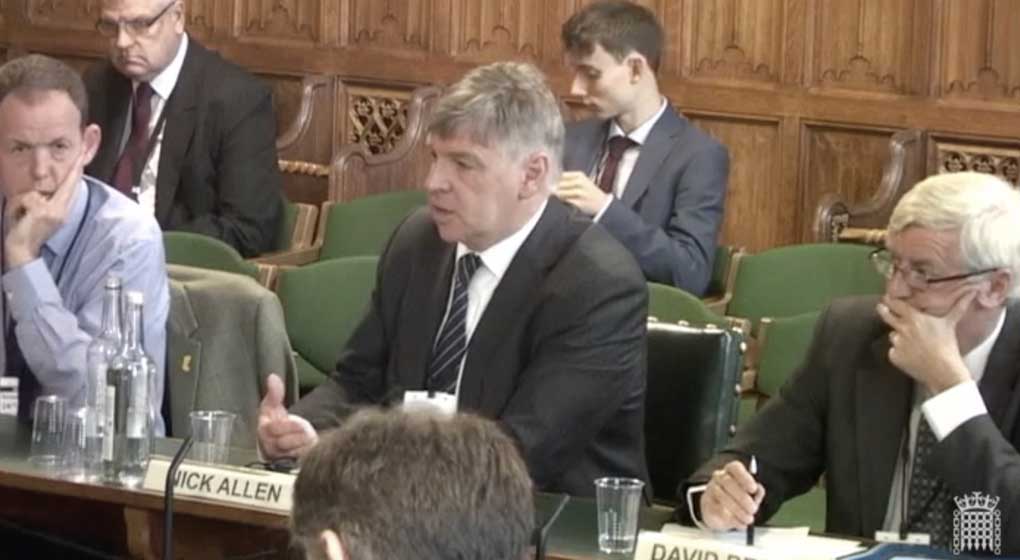EFRA receptive to meat industry concerns
Following last week’s EFRA Committee meeting to discuss the new Agricultural Bill at which BMPA CEO Nick Allen gave evidence, we take another look at the key issues concerning BMPA members.
It was encouraging to see that most of the MPs at the meeting were very receptive to the concerns of the meat industry and it was apparent that they were taking an open-minded approach.
Sheep meat
One of the major concerns Nick raised was that the Bill will need to support sheep farmers much more effectively if Britain were to leave the EU without a deal. Europe is our single biggest market for sheep meat (we export between 70 and 80% to the EU) and this will not be replaced easily.
Unlike the dairy industry where income is generated more smoothly throughout the year through monthly production, sheep farmers get one opportunity a year. If demand falls off a cliff after Brexit, many producers will not be able, or will choose not to come back from that single big hit to demand and prices. The real concern here is that this could have a devastating and long-lasting impact on British sheep farming.
Export figures recently published by Eurostat suggest there is cause for more immediate concern. The latest numbers show that France appears to have moved to sourcing much more of its lamb from Spain instead of the UK. The figures show UK production and export declining substantially and Spain’s exports rising to feed that demand.
It illustrates the point that Nick made to the EFRA Committee that the UK simply can’t rely on the EU market after a no-deal Brexit as demand will be satisfied by other countries such as Spain, New Zealand and Australia.
Food production vs environmental goals
A recurring concern throughout this consultation process has been how we might reconcile the dual imperatives of sustainable food production and better environmental management. Meat industry players have already expressed a concern that food production in the UK could start to decline leaving us more reliant on imports, so we need to ensure the new Bill doesn’t exacerbate this and accelerate the decline.
One suggestion is that we avoid having generic rules for farmers and instead have more tailored support. Farm businesses vary hugely so a one-size-fits-all approach to payments and support will be too much of a blunt instrument. Nick suggested to the Committee that the new payments system should be less a subsidy and more a ‘safety net’.
the UK simply can’t rely on the EU market after a no-deal Brexit as demand will be satisfied by other countries such as Spain, New Zealand and Australia.
Central to this will be access for farm businesses to a network of good quality advice to help farmers navigate and use this new system of payments. If farms are to improve productivity as well as deliver on the environmental aims of the Bill, they will require quite a complicated set of guidance and support to implement a new system of integrated farm management. Advice would span a number of separate specialist areas that all need to be brought together in a practical plan for each individual farm.
The current thinking is that support would be provided by private consultancies rather than a central Government advice bureau.
Collaboration
Underpinning this whole debate has been the need for Government, Civil Servants and industry players to collaborate much more closely when drafting and implementing legislation. Nick and the other panel members agreed that this has not traditionally been the UK’s strongest suit. Indeed, much legislation in the past has had precious little involvement from the companies it will have the most impact on.
All agreed on the need for a change of culture in this country to involve industry more meaningfully. Nick pointed out that this new Bill contains many Government powers but little vision of how and to what end they will be implemented.
At one extreme these powers could prove quite draconian; at the other extreme they could be quite loose and accommodative. The unknown element is how prescriptive or heavy-handed Government will be in directing what and how farmers produce. What’s lacking is a picture of the Government’s vision for how this will all play out.
Either way, industry needs to be more involved in shaping the finer details of how these powers are implemented, which is what happens in other countries. We do, however, remain optimistic that this is starting to happen. BMPA has been much more closely involved with Defra over recent months and there is a definite shift towards a more inclusive and collaborative working relationship.
The British Meat Processors Association will continue to work with Government and the Civil Service to ensure that the meat industry plays its part in shaping the future of food production in the UK. And, we will continue to engage with meat industry players to ensure that their concerns and ideas are being heard.






